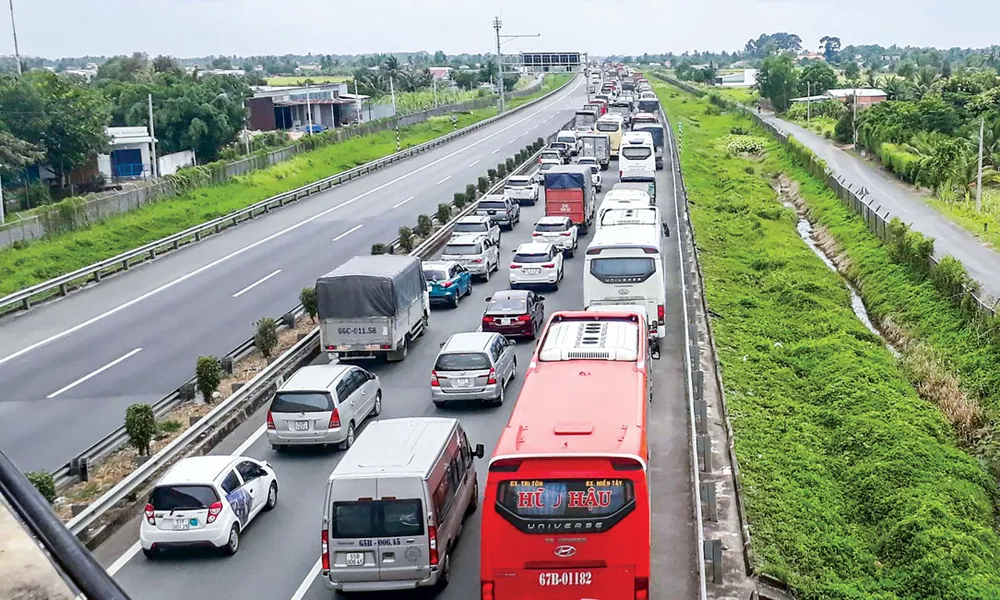
More allocated funds
Mr. Nguyen Chi Dung, the Minister of Planning and Investment, announced the decision of the Prime Minister to increase financial resources for the development of the fertile Mekong Delta Region. Support from the central government will include more allocated funds for the local budget in coming time to implement many essential infrastructure projects.
During the period 2021 until 2025, the Ministry of Planning and Investment will lend support to the local budget through donor funding of about USD 1.05 bn, and will focus on completing the entire coastal road network across the Mekong Delta provinces, as well as add some more important transportation projects in this region. The Ministry of Planning and Investment will work with localities and a regional council on all planning of projects before submitting to the Government for approval. Each locality will be supported with atleast one important motivational project for inter-regional development in coming time.
Mr. Nguyen Chi Dung affirmed that in order to successfully implement a complete network of coastal roads across the Mekong Delta Region, they need to focus resources on the most necessary infrastructure first. Hence, the expressways from Ca Mau to Bac Lieu, and Bac Lieu to Can Tho, will be completed on a priority basis before 2025.
Targets set by Ministry
The entire Mekong Delta Region holds boundless potential for further development. However, in the present infrastructure conditions, many essential agricultural produce are being held up due to poor connectivity and traffic congestion, which is also a big drawback for the development of tourism in this southwest region.
The only road connecting Ho Chi Minh City with the provinces in the southwestern part of the country is the National Highway 1A which is already under heavy pressure, with frequent traffic jams that stretch over tens of kilometers along Tien Giang province. Earlier, a plan to deal with this traffic overload was implemented with the addition of the N2 road from Thanh Hoa to Long An province so as to link with Ho Chi Minh City, but this too proved ineffective in dealing with the increasing daily traffic volume.
The challenges in developing this vast network of roads across the Mekong Delta Region are indeed huge. The Ho Chi Minh City-Trung Luong expressway stopped charging a toll fee many years back and is now fast deteriorating because of poor maintenance, while the Trung Luong-My Thuan expressway is still under construction, along with the My Thuan-Can Tho expressway. At the last National Assembly forum, many delegates expressed doubt over the possibility of completing the 300km expressway by 2025.
Mr. Nguyen Van The, the Minister of Transport, said that the goal is to complete the entire network as per target. The evidence is that we now have the 40km Ho Chi Minh City-Trung Luong expressway almost ready by the end of this year, and the 24km Trung Luong-My Thuan route will open for traffic as planned by 2021. There will be a 7km stretch that is ready to connect to My Thuan 2 bridge by 2023, and 23km of the My Thuan-Can Tho expressway will start construction in December. By 2023 a highway road will also connect Ho Chi Minh City to Can Tho province.
According to Mr. Nguyen Van The, by the end of this year the Prime Minister will inaugurate the road from Vam Cong to Rach Soi, for which currently the 26km section from Cao Lanh bridge to Vam Cong bridge is being completed to announce the expressway. Thus, the route from Ho Chi Minh City to Can Tho, and Cao Lanh to Vam Cong and Rach Soi will be around 210km. The Lang Son-Ca Mau expressway is also planned for completion by 2025. Also, the 30km Cao Lanh-An Huu bridge will be completed and from Ho Chi Minh City to Kien Giang there will be a second branch of the expressway.
Apart from the expressways, the Ministry of Transport is concentrating on four vertical axis including the Ho Chi Minh road through Dong Thap Muoi connecting Kien Giang province, upgraded of the National Highway 1, connecting Ho Chi Minh highway to Ca Mau, and completing Highway 60 across the Rach Mieu bridge. Particularly, in the horizontal axis, there will be four axis that will include Highway 62 connecting Binh Dien border gate, Hong Ngu-Tra Linh expressway connecting the border gate, parallel axis Highway 91 and Chau Doc-Can Tho-Soc Trang expressway, and the Kien Giang-Bac Lieu expressway and Rach Gia-Xa Thia section. With the main vertical and horizontal axis, the Mekong Delta will have improved infrastructure in coming time.
Essential water supply
Faced with several ongoing worrisome problems, Ms. Nguyen Thi Kim Ngan, Chairwoman of the National Assembly, asked to see clear targets and plans by prioritizing which projects to start first. Ms. Nguyen Thi Kim Ngan said that from Ho Chi Minh City to the Mekong Delta region there is a connecting 40km of highway, hence planning and prioritizing is necessary at first, and therefore the Ministry of Transport and the Ministry of Planning and Investment must advise the Government on the most suitable and effective solutions.
Besides an improved and upgraded transportation system, the construction of freshwater reservoirs for the Mekong Delta region are also a priority. Mr. Tran Hong Ha, Minister of Natural Resources and Environment, believes that the Southwest region is being seriously affected by climate change. Therefore, the preparation of freshwater storage reservoirs, especially the maintenance of the Long Xuyen quadrangle lake, to prepare for future supply of water and wastewater treatment in the region, is vital for the further development of agriculture.
The over exploitation of groundwater is also a worrisome issue, and therefore it is important to find immediate and effective solutions for the supply of good clean water. As over exploitation leads to saline intrusion, it is necessary to restrict the amount of water extraction, improve the water quality, and monitor level of groundwater throughout the flood season for future sustainability.




















